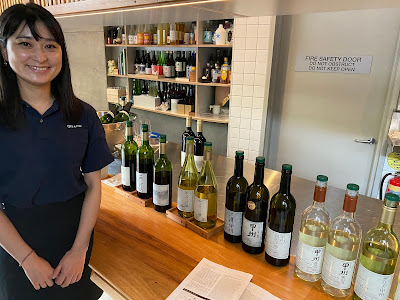Grace Wines is a Japanese family business which celebrates 100 years this year. I had an opportunity to taste the full range with Ayana Misawa, the 5th generation winemaker. In this first part, I will review the classic range of Koshu wines grown in the hilly Katsunuma district of Yamanashi, north of Mt. Fuji. Koshu was first cultivated in the Caucasus region more than 1000 years ago and brought to Japan via the Silk Road. Today, it is Japan's signature grape variety.
The best way to think about the traditional Grace Koshu wines is that there are three varietal wines and two single vineyard wines. I will report on them in the order of the tasting, which was perhaps not ideal. The first was the 2021 Koshu Kayagatake. This is a blended wine from vineyards in the Mt. Kayagatake region. The soil is volcanic. This is a very light and delicate wine, but it lacks of the precision of the later wines (89 points).
This was followed by the 2021 Grace Koshu. This is the village wine from Katsunuma Village and the standard bearer of Grace Wines. The soil here is predominantly clay with sand. The delicate flavours include white flowers, white peach, and grapefruit. There is more intensity here than in the first wine, and the supple acidity keeps it fresh (91 points). This was matched with the 2012 Grace Koshu. This wine had a golden colour, but it was still fresh with some toasty notes added. There was a little sweetness on the finish. This wine reminded me of a maturing Hunter Valley Semillon (93 points).
The 2021 Gris de Koshu should perhaps have been the first wine. However, the 4g of residual sugar made it more aromatic and moved it down the tasting order. The Gris is another regional wine. It is a little broader and has a bit of a jammy character (88 points).
The first of the single vineyard wines, the 2021 Hishiyama Vineyard Koshu, comes from a vineyard at 550m, while most of the fruit for the wines above comes from vineyards of 300-400m altitude. This means lower yield, and increased drainage from the granite floor. These terroir features are well translated into the wine. There is some smokiness on the nose, in addition to white flower. The wine has more drive and energy. Earthy notes and minerality on the finish add complexity to the still delicate fruit flavours. I liked this wine a lot (94/+++ points).
The 2021 Toriibira Vineyard Koshu from a nearby vineyard is more south facing. It has particularly long sunshine hours, but also significant diurnal temperature differences. The soil here is clay, gravel, and some slate. This is a riper wine with a bigger mouthfeel, good intensity, but still in the 'delicate' space (92 points).
Then there is the 2021 Toriibira Vineyard Private Reserve from a special block of this vineyard. This wine is riper and displays tropical fruits; melon, yellow peach and papaya. This is the first Koshu which sees oak, three months of seasoned oak. It works well (94 points).
In part 2, I will describe wines which are less standard or expected, some are revelations. But for now, are Grace Wines the most delicate in the world? I think they are, in my experience.








No comments:
Post a Comment